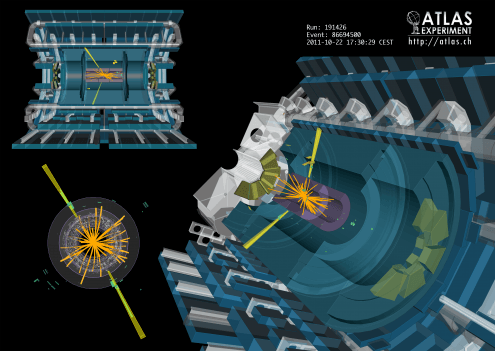The ATLAS experiment at CERN
By Oli Usher, on 28 July 2014

A two-photon event captured in the ATLAS experiment at CERN. This is one of the experiments that analyse particles accelerated and collided in the Large Hadron Collider, and played a key role in the discovery of the Higgs Boson. Photo credit: CERN (CC-BY-SA 4.0)
Peter Higgs, who predicted the existence of the Higgs Boson in the 1960s, is usually associated with the University of Edinburgh, where he spent most of his career. But we want to claim just a little credit for ourselves: Higgs briefly worked as a lecturer in UCL’s Department of Mathematics in 1960 (four years before postulating the existence of the particle that bears his name), and was awarded an honorary degree by UCL in 2010 (three years before winning the Nobel Prize in Physics). Clearly there is a correlation.
A more concrete and less contrived contribution by UCL to the discovery of the Higgs Boson comes from UCL’s involvement in the ATLAS experiment at CERN. Along with the CMS experiment (also at CERN), ATLAS finally provided concrete experimental corroboration of the existence of the Higgs particle in 2012.
A rendering of an experiment using ATLAS provides this week’s UCL Science Picture of the Week.
Numerous UCL physicists have been involved with the ATLAS project over the years, and when the collaboration’s paper setting out the evidence it had found for the Higgs Boson was published, 24 members of the Physics & Astronomy department were listed among the (many) authors on the paper.
Jon Butterworth, head of physics at UCL and a major participant in the ATLAS collaboration, will be hosting an evening of particle physics at UCL on 20 August 2014. Introducing the Large Hadron Collider, a virtual visit to CERN hosted by David Miller of Chicago University, a talk by TEDx speaker Lily Asquith about sonificiation of LHC data, and a Q&A session in which you can ask all your burning particle physics questions, the event is free and suitable for everyone from ages 12 up.
Links
- Booking page for ‘An Evening of Particle Physics’ with Prof Jon Butterworth
- ATLAS collaboration paper
- UCL Physics & Astronomy
- UCL High Energy Physics research group
High resolution image
- Download a high-resolution image from Flickr
- Download a high-resolution image from CERN Document Server
CERN have made available thousands of pictures, videos and photos of their work that are well worth checking out, all of which are totally free for educational and informational use. They even have a collection of photos – including this one – which are available under Creative Commons licences, which have even fewer restrictions on their reuse.
 Close
Close


